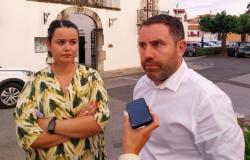
Within the Cannes hospital, the CeGIDD (Free Information, Screening and Diagnostic Center) offers free and anonymous screenings all year round to people over 15 years old. A whole team takes turns to raise awareness, inside the center but also outside, young and old about the risks linked to STIs (sexually transmitted infections). And if it is possible to get tested for HIV free of charge without a prescription in a laboratory, for other STIs, only CeGIDD is able to do it anonymously and free of charge.
On the occasion of Sexual Health Week which begins today, CeGIDD is opening its doors and inviting everyone to come and meet the team, see the premises and, why not, get tested. All exceptionally without appointment, from 10 a.m. to 4 p.m., today to Friday.
The caregivers S. Manni, S. Dipace, C. Studer and M. Vassello answered our questions about STIs, treatments and especially screening, because “the earlier it is detected, the better and the more we avoid transmitting it to others”.
How many people come to be tested at CeGIDD?
We are at just over 1,000 people for 2023. And we have observed a sharp increase in STIs in the Alpes-Maritimes over the past 2 years. To give you an idea: we have had 10 new HIV contaminations in 5 months. Last year, over the whole of 2023, we had 11, which was already higher than other years…
The age of users is not necessarily the same for all STIs: between 30 and 45 years for new HIV discoveries, and as for those screened positive for chlamydia and gonococcus, they are a little younger.
What are the main symptoms of these STIs? And what consequences?
When it comes to HIV, you can have symptoms, a bit like the flu. But that concerns few people. You can be contaminated without realizing it.
For the consequences, if we talk about HIV and hepatitis C and B, we can have chronic infections which can cause complications, up to liver cancer (for hepatitis), and up to AIDS for HIV. . AIDS is the progressive stage of the disease, when we lose our immune defenses, to the point that microbes which are not dangerous for others can give people with AIDS significant complications.
If you discover your HIV status early and take treatment early, you will not progress to the AIDS stage. In this case, we are no longer contagious, but HIV infection remains associated with a whole series of complications: cardiac, bone, renal, neurological. Probably because there is chronic inflammation, generated by the virus. As if there was more accelerated cellular aging than normal, even while under treatment.
Syphilis can have neurological consequences, and with chlamydia we can have fertility problems.
Are there any treatments?
Chlamydia, gonorrhea and syphilis can be cured if treated. But we may not be cured of hepatitis B and C, nor of HIV. But it is mainly HIV and hepatitis B which remains for life. There have already been some extremely rare cases of HIV cure, but this remains exceptional, these are people who have undergone a transplant from certain donors.
How is a screening test done?
At CeGIDD, for HIV, syphilis and hepatitis B and C, it is a classic test, a blood test. This has the advantage of detecting the disease very early. Afterwards, for other STIs, these are self-samples: oral, anal, vaginal, etc.
What other preventive actions, besides screening?
Prevention also involves vaccination. For minors, consent from a parent is required.
There are also pre-exposure pills, which can be taken before sex to protect against HIV. This concerns everyone, but especially people who take a lot of risks. This allows us to offer them follow-up, with screening every three months, to discuss sexuality…
Otherwise, before sexual intercourse, regarding the fight against HIV, there is the pill, screening, information. Then, during, the condom. And, after a risky relationship, there is also treatment within 48 hours. It is the combined set of all these prevention methods that will succeed in, perhaps, reducing the disease.
Open days at CeGIDD in Cannes on the occasion of Sexual Health Week, from 10 a.m. to 4 p.m. from today to Friday. 15 avenue des Broussailles.
“There are people who treat us like plague victims”
Robert (1) is HIV positive and has been followed by CeGIDD in Cannes for several years now. He wanted to testify “to help young people”.
“I lived with a person who went elsewhere and got HIV. And who passed it on to me. And I had this famous carabiner flu in August. So I got tested, and I had to wait three months to find out the results. It was distressing. He knew he had HIV, but it didn’t bother him. He didn’t realize the gravity…”
HIV positive since 2008, he has undergone several treatments. After the pills – “you take a medicine that reminds you every day that you have HIV” – he moved on to injections, to be done every two months.
“Young people currently trivialize HIV a lot, because they know that now there are treatments, and that we no longer really die from it, like in the 1980s. But they do not know that the treatment is heavy, painful and difficult to bear, and that there are sometimes terrible side effects, particularly at the intestinal level. »
“Fortunately, CeGIDD caregivers really listen. If we have a question, they are often available to answer it. »
“A daily suffering”
And if the side effects are no longer as undesirable as in the 1980s, life as an HIV-positive person is still not all rosy. Because HIV interferes in all aspects of the patient’s life. Social, sentimental, family…
“You get rejected sometimes by people in the medical field. In the 1980s, if you were HIV positive, you wouldn’t be shaken or kissed. Nowadays, there are still people who react like that. Who treats us like plague victims. It is a daily suffering. You have to inform people, not trivialize HIV: as soon as you say you are sick, there are people who don’t react very well, even those you have known for years. »
And then, on an intimate and romantic level, even if the treatment prevents transmission of the virus, “when you say that you are HIV positive, there are many who run away.” HIV “ruins” life. And “puts you in permanent depression and terror.” If you have any kind of pimple, you think it might be HIV. We are always afraid of going into the AIDS phase…”
After learning of his HIV status, Robert had to be followed by a psychologist “for a very long time, 5 years. I even had to take antidepressants. Now, in the long term, HIV causes me bone problems, heart problems…”
1. The first name has been changed.





